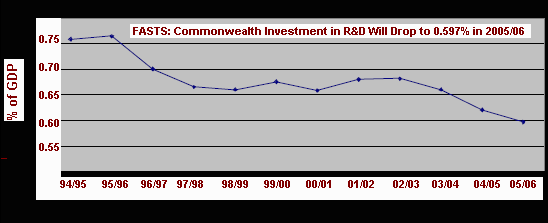|
News & Views item - July 2005 |
![]() European
Scientists Petition EU Leaders to Get Their Act Together. (July 8, 2005)
European
Scientists Petition EU Leaders to Get Their Act Together. (July 8, 2005)
The 2-day meeting last month in Brussels, aimed at determining an E.U. budget for 2007-13, ended inconclusively primarily because the United Kingdom refused to forgo its multi-billion dollar rebate if negotiations on the union's agricultural subsidies weren't reopened--a condition to which the French President Jacques Chirac would not accede.
One result of the impasse is that it has put on hold -- perhaps permanently -- aspirations for far-reaching European science policies, promulgated two months ago by the European Commission, the most important of which was the proposal to double the E.U.'s science budget. It could spell the end of the plan to inaugurate a European Research Council (ERC) to fund basic research.
As Science reported last week, "In April, the European Commission had rolled out its proposal for Framework 7 (FP7), the most ambitious of the E.U.'s research programs yet. At €73 [A$118] billion, the 7-year program would have more than doubled the E.U.'s annual expenditure on research and innovation."
E.U. Commissioner for Research Janez Potocnik told Science the financial decisions will be a "moment of truth for the E.U." Potocnik was in Berlin on 2 June to try to persuade German leaders--some of the main holdouts in the budget battles--of the importance of research in the E.U. He told Science that European politicians say repeatedly that research and innovation should be the highest priority. But protecting subsidies and capping national contributions "turn out to have slightly higher priority."
Now a petition signed by over 12,000 European scientists has been sent to the EU leaders calling for increased research funding. It's debatable whether any notice will be taken. Frank Gannon, president of the European Molecular Biology Organization says that when budgets are tight, science is the first to go.
As Australian researchers are all too aware, budgets don't even need to be particularly tight.
